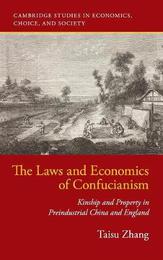
|
The Laws and Economics of Confucianism: Kinship and Property in Preindustrial China and England
Hardback
Main Details
| Title |
The Laws and Economics of Confucianism: Kinship and Property in Preindustrial China and England
|
| Authors and Contributors |
By (author) Taisu Zhang
|
| Series | Cambridge Studies in Economics, Choice, and Society |
|---|
| Physical Properties |
| Format:Hardback | | Pages:318 | | Dimensions(mm): Height 235,Width 156 |
|
| Category/Genre | Confucianism
Development economics |
|---|
| ISBN/Barcode |
9781107141117
|
| Classifications | Dewey:330.170951 |
|---|
| Audience | | Professional & Vocational | |
|---|
|
Publishing Details |
| Publisher |
Cambridge University Press
|
| Imprint |
Cambridge University Press
|
| Publication Date |
12 October 2017 |
| Publication Country |
United Kingdom
|
Description
Tying together cultural history, legal history, and institutional economics, The Laws and Economics of Confucianism: Kinship and Property in Preindustrial China and England offers a novel argument as to why Chinese and English preindustrial economic development went down different paths. The dominance of Neo-Confucian social hierarchies in Late Imperial and Republican China, under which advanced age and generational seniority were the primary determinants of sociopolitical status, allowed many poor but senior individuals to possess status and political authority highly disproportionate to their wealth. In comparison, landed wealth was a fairly strict prerequisite for high status and authority in the far more 'individualist' society of early modern England, essentially excluding low-income individuals from secular positions of prestige and leadership. Zhang argues that this social difference had major consequences for property institutions and agricultural production.
Author Biography
Taisu Zhang is an Associate Professor of Law at Yale Law School, Connecticut and works on comparative legal history - specifically, economic institutions in modern China and early modern Western Europe - comparative law, property law, and contemporary Chinese Law. This is his first book. In dissertation form, it was the recipient of Yale University's Arthur and Mary Wright Dissertation Prize and the American Society for Legal History's Kathryn T. Preyer Award. Zhang is a founding board member of the International Society for Chinese Law and History.
Reviews'In this lucid and thought-provoking study, Taisu Zhang creatively and empirically reinterprets the causal relationships among cultural norms, property institutions, and socioeconomic behavior in early modern China and England. This holds profound implications for the study of global economic history, Sino-Western comparison, and Chinese law and society. This important book will not fail to stimulate new inquiries and debates for many years to come.' Li Chen, University of Toronto, author of Chinese Law in Imperial Eyes and President of the International Society for Chinese Law and History 'Marrying cutting-edge historical archival work with remarkable cross-disciplinary theoretical breadth, Taisu Zhang boldly and brilliantly raises vitally important questions about the interplay of culture, law, and economic institutions in pre-industrial China and England. Anyone interested in global economic history or in today's China will want to engage this powerful but inviting book.' William P. Alford, Henry L. Stimson Professor of Law, Harvard Law School, Massachusetts 'Taisu Zhang has taken a bold leap into the heart of the Great Divergence debate. Combining the theoretical tools of law and economics, the insights of a comparative legal historian, and the skills of a meticulous archival investigator, Zhang offers a new take on norms governing land alienation in early modern China and England and their impact on economic development.' Madeleine Zelin, Dean Lung Professor of Chinese Studies, Columbia University, New York
|